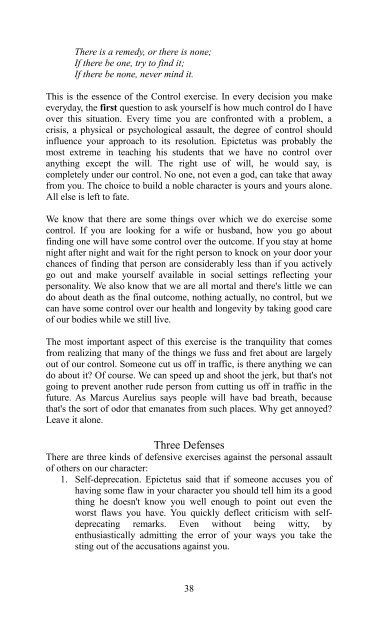The Stoic HANDBOOK - College of Stoic Philosophers
The Stoic HANDBOOK - College of Stoic Philosophers
The Stoic HANDBOOK - College of Stoic Philosophers
Create successful ePaper yourself
Turn your PDF publications into a flip-book with our unique Google optimized e-Paper software.
<strong>The</strong>re is a remedy, or there is none;<br />
If there be one, try to find it;<br />
If there be none, never mind it.<br />
This is the essence <strong>of</strong> the Control exercise. In every decision you make<br />
everyday, the first question to ask yourself is how much control do I have<br />
over this situation. Every time you are confronted with a problem, a<br />
crisis, a physical or psychological assault, the degree <strong>of</strong> control should<br />
influence your approach to its resolution. Epictetus was probably the<br />
most extreme in teaching his students that we have no control over<br />
anything except the will. <strong>The</strong> right use <strong>of</strong> will, he would say, is<br />
completely under our control. No one, not even a god, can take that away<br />
from you. <strong>The</strong> choice to build a noble character is yours and yours alone.<br />
All else is left to fate.<br />
We know that there are some things over which we do exercise some<br />
control. If you are looking for a wife or husband, how you go about<br />
finding one will have some control over the outcome. If you stay at home<br />
night after night and wait for the right person to knock on your door your<br />
chances <strong>of</strong> finding that person are considerably less than if you actively<br />
go out and make yourself available in social settings reflecting your<br />
personality. We also know that we are all mortal and there's little we can<br />
do about death as the final outcome, nothing actually, no control, but we<br />
can have some control over our health and longevity by taking good care<br />
<strong>of</strong> our bodies while we still live.<br />
<strong>The</strong> most important aspect <strong>of</strong> this exercise is the tranquility that comes<br />
from realizing that many <strong>of</strong> the things we fuss and fret about are largely<br />
out <strong>of</strong> our control. Someone cut us <strong>of</strong>f in traffic, is there anything we can<br />
do about it? Of course. We can speed up and shoot the jerk, but that's not<br />
going to prevent another rude person from cutting us <strong>of</strong>f in traffic in the<br />
future. As Marcus Aurelius says people will have bad breath, because<br />
that's the sort <strong>of</strong> odor that emanates from such places. Why get annoyed?<br />
Leave it alone.<br />
Three Defenses<br />
<strong>The</strong>re are three kinds <strong>of</strong> defensive exercises against the personal assault<br />
<strong>of</strong> others on our character:<br />
1. Self-deprecation. Epictetus said that if someone accuses you <strong>of</strong><br />
having some flaw in your character you should tell him its a good<br />
thing he doesn't know you well enough to point out even the<br />
worst flaws you have. You quickly deflect criticism with selfdeprecating<br />
remarks. Even without being witty, by<br />
enthusiastically admitting the error <strong>of</strong> your ways you take the<br />
sting out <strong>of</strong> the accusations against you.<br />
38

















